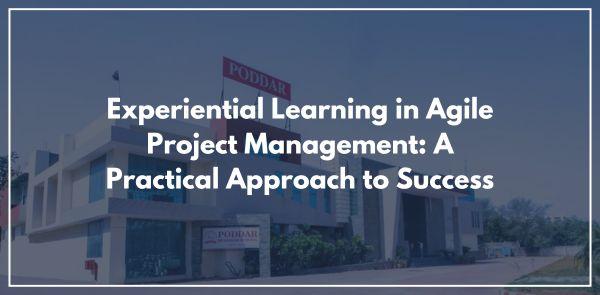
Introduction: In today’s fast-paced business environment, Agile Project Management has emerged as a popular methodology that ensures flexibility, collaboration, and efficiency in project execution. Unlike traditional project management approaches, Agile focuses on incremental progress, continuous feedback, and adaptability to changing requirements, making it an ideal choice for industries like software development, marketing, and product innovation. Integrating experiential learning into Agile Project Management enhances hands-on understanding, enabling students and professionals to apply Agile principles effectively in real-world scenarios.
Understanding Agile Project Management Agile Project Management is an iterative approach that divides projects into small, manageable units called sprints. Each sprint delivers a functional part of the project, allowing teams to make adjustments based on stakeholder feedback. This methodology promotes collaboration, rapid decision-making, and improved customer satisfaction. When coupled with experiential learning, Agile becomes more impactful as individuals engage in practical exercises, live projects, and real-time problem-solving to grasp Agile concepts.
Experiential Learning in Agile Project Management Experiential learning in Agile Project Management involves hands-on activities that simulate real project environments. Some key approaches include:
- Live Agile Projects: Working on actual projects using Agile frameworks such as Scrum or Kanban to gain direct experience.
- Case Studies: Analyzing past Agile implementations to understand best practices and challenges.
- Simulations and Role-Playing: Engaging in scenario-based learning to practice Agile decision-making and team collaboration.
- Workshops and Hackathons: Participating in structured learning experiences that promote iterative development and feedback.
- Team-Based Agile Assignments: Collaborating with peers to execute Agile methodologies and reflect on learning outcomes.
Benefits of Experiential Learning in Agile Project Management
- Hands-on Application: Learners gain practical experience by actively engaging in Agile processes.
- Enhanced Problem-Solving Skills: Facing real-world challenges helps improve critical thinking and adaptability.
- Stronger Collaboration: Working in Agile teams fosters communication and teamwork.
- Real-Time Feedback and Improvement: Continuous iteration ensures ongoing learning and skill enhancement.
- Better Preparedness for Industry: Practical exposure equips students and professionals for real Agile work environments.
Conclusion Agile Project Management, when integrated with experiential learning, provides a comprehensive approach to understanding and applying Agile principles. Through hands-on projects, simulations, and real-world problem-solving, learners can develop the skills necessary to navigate dynamic project environments successfully. This approach not only enhances theoretical knowledge but also fosters adaptability, collaboration, and efficiency in professional settings.
